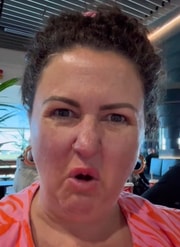Dog owners battle hidden poison threat across country
By
Gian T
- Replies 2
For many of us, our pets are more than just animals—they’re family. They greet us at the door, keep us company on quiet afternoons, and bring joy to our lives in ways only a wagging tail or a gentle purr can.
But what if something lurking in the Australian bush, or even in your local park, could put your companion in grave danger?
That’s the reality Yvette Colomb faced when her rescued greyhound, Elsa, was nearly killed by something that scattered across the country.
Elsa’s story is both heart-wrenching and eye-opening, and it’s one that every Australian pet owner should know.
Yvette first met Elsa on a greyhound adoption site. Elsa, once a racing dog, was on the brink of being euthanised when Yvette stepped in to give her a new lease on life.
The bond was instant, and Elsa quickly became a cherished member of the family.
But in 2020, while visiting a property north of Sydney, disaster struck.
Elsa began vomiting violently, and within minutes, her condition deteriorated.
Yvette rushed her to the emergency vet, fearing the worst. By the time they arrived, Elsa had suffered a seizure and needed life support.
The diagnosis? Elsa had ingested sodium fluoroacetate, better known as 1080—a poison used widely in Australia to control populations of foxes, rabbits, wild dogs, and feral cats.
The poison is applied to food baits and left in the environment, where it’s meant to target pest species.
But as Yvette and Elsa’s story shows, it doesn’t always discriminate.
1080 is derived from a naturally occurring compound found in some Australian plants. Over time, certain native animals have developed a tolerance to it, but our pets—especially dogs—have not.
Just a few milligrams can be fatal, and there’s no antidote. Symptoms in dogs can be horrific: frenzied running, uncontrollable vomiting, howling, confusion, seizures, coma, and often, death.
The use of 1080 is tightly regulated by the Australian Pesticides and Veterinary Medicines Authority (APVMA) and various state and local agencies.
Baits are tailored to target specific pests and are meant to be placed carefully to minimise risk to non-target animals.
But as many pet owners know, dogs are curious creatures, and it only takes a moment for them to find something dangerous.
Elsa’s prognosis was grim. The vet told Yvette that very few animals survive 1080 poisoning.
But Yvette wasn’t ready to give up. Despite not having pet insurance, she begged the vet to do everything possible.
Against the odds, Elsa survived after nearly two weeks in emergency care and months of rehabilitation.
The ordeal left Elsa permanently disabled, with mobility issues and a long road to recovery.
The financial toll was staggering—over $20,000 in vet bills, with Yvette paying $8,000 out of pocket and fundraising the rest.
But for Yvette, no price was too high to save her companion.
Elsa’s story touched thousands, with over 10,000 animal lovers following her journey on Facebook.
But Yvette’s mission didn’t end with Elsa’s recovery. She’s now campaigning to ban 1080 baits across Australia, arguing that no animal—pet or pest—should suffer such a cruel fate.
'It’s a horrible way to die,' Yvette says. 'I understand that foxes need to be taken care of, but I think we need to do it in a responsible and humane way. I don’t think we can just drop poison into our environment and hope for the best.'
Her Change.org petition has already gathered more than 3,000 signatures, and she’s preparing to take her fight to the Federal Parliament.
Yvette’s only regret is not starting sooner: 'Why did I wait so long? I need to make Elsa’s memory count.'
The use of 1080 is a contentious issue in Australia. On one hand, it’s seen as a necessary tool for controlling invasive species that threaten native wildlife and agriculture.
On the other hand, it poses a real risk to pets and even native animals that have yet to develop a tolerance.
Animal welfare groups and scientists are divided on the issue. Some argue that 1080 remains the most effective option for large-scale pest control until a safer alternative is found.
Others, like Yvette, believe the risks far outweigh the benefits and that more humane, targeted methods should be prioritised.

Have you or someone you know had a close call with 1080 baits? Do you think Australia should ban this poison, or is it a necessary evil for protecting our native wildlife? We’d love to hear your thoughts and experiences—share your stories in the comments below.
Read more: Australians Beware: The Deadly Substance Lurking in the Bush That No One Is Talking About
But what if something lurking in the Australian bush, or even in your local park, could put your companion in grave danger?
That’s the reality Yvette Colomb faced when her rescued greyhound, Elsa, was nearly killed by something that scattered across the country.
Elsa’s story is both heart-wrenching and eye-opening, and it’s one that every Australian pet owner should know.
Yvette first met Elsa on a greyhound adoption site. Elsa, once a racing dog, was on the brink of being euthanised when Yvette stepped in to give her a new lease on life.
The bond was instant, and Elsa quickly became a cherished member of the family.
But in 2020, while visiting a property north of Sydney, disaster struck.
Elsa began vomiting violently, and within minutes, her condition deteriorated.
Yvette rushed her to the emergency vet, fearing the worst. By the time they arrived, Elsa had suffered a seizure and needed life support.
The diagnosis? Elsa had ingested sodium fluoroacetate, better known as 1080—a poison used widely in Australia to control populations of foxes, rabbits, wild dogs, and feral cats.
The poison is applied to food baits and left in the environment, where it’s meant to target pest species.
But as Yvette and Elsa’s story shows, it doesn’t always discriminate.
1080 is derived from a naturally occurring compound found in some Australian plants. Over time, certain native animals have developed a tolerance to it, but our pets—especially dogs—have not.
Just a few milligrams can be fatal, and there’s no antidote. Symptoms in dogs can be horrific: frenzied running, uncontrollable vomiting, howling, confusion, seizures, coma, and often, death.
The use of 1080 is tightly regulated by the Australian Pesticides and Veterinary Medicines Authority (APVMA) and various state and local agencies.
But as many pet owners know, dogs are curious creatures, and it only takes a moment for them to find something dangerous.
Elsa’s prognosis was grim. The vet told Yvette that very few animals survive 1080 poisoning.
But Yvette wasn’t ready to give up. Despite not having pet insurance, she begged the vet to do everything possible.
Against the odds, Elsa survived after nearly two weeks in emergency care and months of rehabilitation.
The ordeal left Elsa permanently disabled, with mobility issues and a long road to recovery.
But for Yvette, no price was too high to save her companion.
Elsa’s story touched thousands, with over 10,000 animal lovers following her journey on Facebook.
But Yvette’s mission didn’t end with Elsa’s recovery. She’s now campaigning to ban 1080 baits across Australia, arguing that no animal—pet or pest—should suffer such a cruel fate.
'It’s a horrible way to die,' Yvette says. 'I understand that foxes need to be taken care of, but I think we need to do it in a responsible and humane way. I don’t think we can just drop poison into our environment and hope for the best.'
Her Change.org petition has already gathered more than 3,000 signatures, and she’s preparing to take her fight to the Federal Parliament.
The use of 1080 is a contentious issue in Australia. On one hand, it’s seen as a necessary tool for controlling invasive species that threaten native wildlife and agriculture.
On the other hand, it poses a real risk to pets and even native animals that have yet to develop a tolerance.
Animal welfare groups and scientists are divided on the issue. Some argue that 1080 remains the most effective option for large-scale pest control until a safer alternative is found.
Others, like Yvette, believe the risks far outweigh the benefits and that more humane, targeted methods should be prioritised.
Key Takeaways
- Yvette Colomb’s pet greyhound, Elsa, was left permanently disabled and eventually died after accidentally ingesting 1080 poison baits, which are commonly used across Australia to control pests like foxes and wild dogs.
- Poison is highly toxic to pets like dogs, with no antidote available, and even a small amount can lead to severe suffering or death.
- Colomb spent thousands of dollars on vet care and rehabilitation for Elsa, funded partly through her own money and fundraising, and she used social media to warn other pet owners about the risks of 1080.
- Following Elsa's ordeal, Colomb has launched a campaign and petition to ban 1080 poison in Australia, arguing it's an inhumane way to control pests and poses an unacceptable risk to domestic animals.
Read more: Australians Beware: The Deadly Substance Lurking in the Bush That No One Is Talking About







